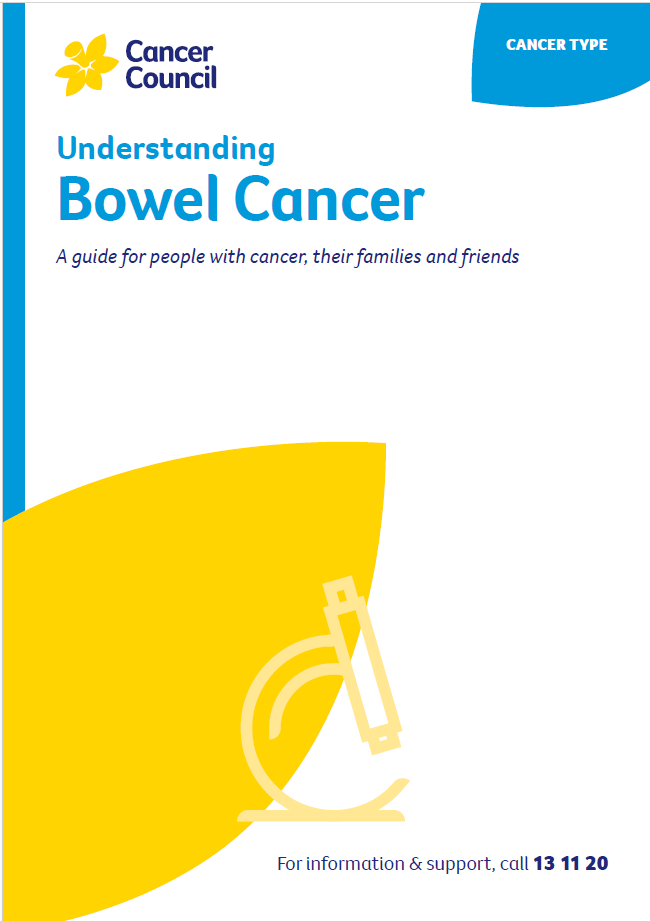- Home
- Bowel cancer
- Managing side effects
- Managing bowel and dietary changes
- Diarrhoea and wind
Diarrhoea and wind
Learn more about managing:
Diarrhoea
Diarrhoea is the frequent passing of loose, watery faeces (stools or poo). It can also cause abdominal cramping, wind and pain.
Different types of treatment can cause diarrhoea:
Surgery
If you have had part of your bowel removed, your bowel movements may be looser than you were used to. This is because the bowel absorbs water to form faeces. With a shorter bowel, the faeces don’t form as solidly as before. This may be ongoing, but there are many ways of managing diarrhoea.
Radiation therapy
Diarrhoea is a common side effect of radiation therapy. It can take some weeks to settle down after treatment has finished. For a small number of people, diarrhoea is ongoing.
Drug therapies
Chemotherapy, immunotherapy and targeted therapy drugs can cause diarrhoea and nausea. These side effects will go away after treatment and you can gradually return to a normal diet.
How to manage diarrhoea
- Eat small frequent meals instead of 3 big ones. Try eating every 2 hours.
- Low-fibre foods may be easier to digest, e.g. bananas, white rice, white pasta, white bread, potatoes, white fish and steamed chicken without the skin.
- Limit foods that increase bowel activity, e.g. caffeine; alcohol; spicy, fatty or oily foods; high-sugar fluids such as juice and soft drink; artificial sweeteners.
- Raw fruits and vegetables, wholegrain breads and cereals, or legumes (e.g. lentils, chickpeas), may make diarrhoea worse. If they do, you may want to cut back on these foods for a few days.
- Lactose in dairy foods may make diarrhoea worse. Try low-lactose or soy-based products instead.
- Watch for warning signs of dehydration. These include a dry mouth, dark yellow urine, dizziness and confusion. If dehydration is left untreated, it can be dangerous.
- Drink plenty of water to avoid becoming dehydrated. Consider having an oral rehydration solution, such as Hydralyte or Gastrolyte.
- If your anus becomes sore, clean the area with warm water and a soft cloth. Ask your treatment team to recommend a cream.
- Having diarrhoea can make you feel tired. Try to rest as much as possible and ask family or friends to help.
- Talk to your treatment team about ways to control diarrhoea, such as using over-the-counter medicines and changing what you eat.
- Ask for a referral to a dietitian or physiotherapist who looks after bowel issues. If diarrhoea continues for a few days, see a doctor.
Wind (flatulence)
Many people who have treatment for bowel cancer, especially surgery, find that it gives them wind, commonly referred to as gas or farting. This is usually temporary and improves with time. See the tips below on what foods to eat and what to avoid. This is a guide only as foods can affect people differently.
How to manage wind
- Try chewing charcoal tablets, eating natural yoghurt and drinking peppermint tea.
- Cut your food into small, bite-sized pieces.
- Chew your food slowly and thoroughly.
- When you have a drink, take small sips and don’t use a straw.
- Talk to your doctor about what types of light exercise you can do to relieve bloating and wind.
- Foods such as eggs, legumes (e.g. lentils and chickpeas), fizzy drinks, and sugar-free foods may increase gas. If they do, you may find it helpful to limit these foods.
- Try keeping a food and symptom diary (see Eating after treatment) to help identify foods that cause wind.
Three months after the ileostomy, I went in for the reversal surgery. You have to stay in hospital until you pass wind, which took six days. Passing wind will never lose its amusement.
Richard
→ READ MORE: Eating after treatment
Podcast: Appetite Loss and Nausea
Listen to more episodes from our podcast for people affected by cancer
More resources
A/Prof David A Clark, Senior Colorectal Surgeon, Royal Brisbane and Women’s Hospital, QLD, The University of Queensland and The University of Sydney; Yvette Adams, Consumer; Dr Cameron Bell, Gastroenterologist, Royal North Shore Hospital, NSW; Katie Benton, Advanced Dietitian Cancer Care, Sunshine Coast University Hospital and Queensland Health, QLD; John Clements, Consumer; Dr Fiona Day, Medical Oncologist, Calvary Mater Newcastle, NSW; Alana Fitzgibbon, Clinical Nurse Consultant, GastroIntestinal Cancers, Cancer Services, Royal Hobart Hospital, TAS; Prof Alexander Heriot, Consultant Colorectal Surgeon, Director Cancer Surgery, Peter MacCallum Cancer Centre, and Director, Lower GI Tumour Stream, Victorian Comprehensive Cancer Centre, VIC; Caitriona Nienaber, 13 11 20 Consultant, Cancer Council WA; Dr Kirsten van Gysen, Radiation Oncologist, Nepean Cancer Care Centre, NSW.
View the Cancer Council NSW editorial policy.
View all publications or call 13 11 20 for free printed copies.

